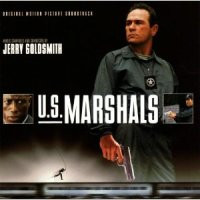- Composed by Jerry Goldsmith
- Varèse Sarabande / 1998 / 30:17
US Marshals saw Tommy Lee Jones reprise his role as Samuel Gerard, which he’d first played in The Fugitive. This time round, he was chasing Wesley Snipes and while the film is clearly not as good as its predecessor, it’s pretty good fun and worth a watch for action movie fans. It was the second (of three) films directed by renowned editor Stuart Baird, who since seems to have given up on having his own directorial career and has gone back to editing (Star Trek Nemesis ended the hopes, I guess).
One thing Baird certainly got right was his composer – the great Jerry Goldsmith, who worked on all three of his films. US Marshals isn’t exactly a masterpiece by Goldsmith standards, but I think that of all the (many) action thriller scores he wrote in the second half of the 1990s and beyond, it’s the best. It was actually a bit of a watershed for the composer, with a slick action style based around a fanfare-like motif becoming a very familiar device in just about all of his action scores thereafter (including both Star Trek films he did, plus The Last Castle, The Sum of All Fears and others). He introduces the motif in the opening track, “Nuggets and Bullets”, in a very sparse arrangement, and after that it’s heard in all sorts of guises over the remainder of the slick album.
There are no bells and whistles here, this is straightforward Goldsmith action/suspense music; in my opinion there’s never been anyone better at it than he, so even though there is little on offer which is particularly distinguished in the context of his whole career, it is so solidly enjoyable that actually this is an album I still play quite frequently, almost 15 years after its release. After the heraldic opening come a string of action pieces, beginning with the exciting “Sinking Plane” and including a couple of six-minute tracks, “Swamp Search” and “Following Chen”, which are great examples of how clever this composer was at managing to inject energy and tension into films which didn’t really manage to conjure them up on their own.
The little low-end piano figures, the occasional explosions of frantically-bowed strings, the fluttering winds in moments of tension, the ever-present percussive forces adding forward momentum – the devices had been tried and tested many times before, but remained just as effective as ever. As in most of his scores for similar films, Goldsmith uses synths throughout, but here they’re just adding texture, playing an appropriate, supporting role. Also as usual, the composer wraps things up with a touch of showmanship, as he takes the motif that has bound the whole score together and fully develops it in the finale, “Free to Go”, with a rousing string version revealing the full extent of the melody.
There are literally dozens of Jerry Goldsmith scores that I’d take to a desert island before US Marshals, but it’s just so entertaining, so expertly crafted, I think it’s one of the most underrated scores in his canon. And, while the somewhat muted reaction the score received at the time was fairly understandable (it did come around the same time as the more direct pleasures of The Edge, Air Force One, The Mummy etc) I think the years have been very kind to it. Part of what made this composer the master he was was the way he didn’t just pile on the thrills through relentless, pounding, frenetic action – there are several composers around today who do that quite well, but they generally don’t do the thing Goldsmith also did so well – and that was the (somewhat obvious, I’d have thought, but recent evidence suggests otherwise) blending of those thrills with enough supporting material to make them feel genuinely earned when they arrive. I doubt that many will share my enthusiasm for this album, but if you’ve had it gathering dust on your shelf for a few years, or you’re a Goldsmith fan who didn’t pick it up at the time, then I’d say it’s well worth giving it another go – you might be surprised at just how good it is. ****













How would you say it compares to its prequel, “The Fugitive” by JNH?
Much better!
Good to see this score getting some love. It’s one of many underrated 90’s Goldsmith scores.
It is a good score but would sound even better as a complete score reissue. There is
still a lot of good action music not on the album and you all know which cues I mean.
The Fugitive is way better, James! This same style wouldn’t have worked in U.S. Marshals, but JNH just nails Chicago (not in a sex way) with his original score.
“I doubt that many will share my enthusiasm for this album”
Well, I for one have always enjoyed it (I am sucker for the composer’s low end piano riffs) and wish Varèse would get off its collective ass and release expanded editions of the many Goldsmith titles they have in their catalogue, including U.S. Marshals.
The Fugitive is a fine score I rarely revisit. U.S. Marshals, however, current boasts a Play-Count of over a hundred in my iTunes library. It simply never gets old.